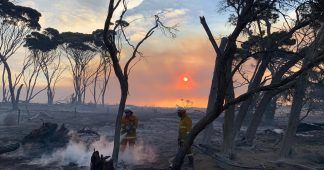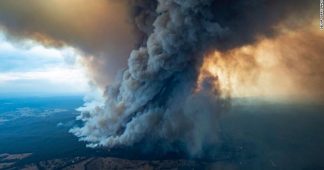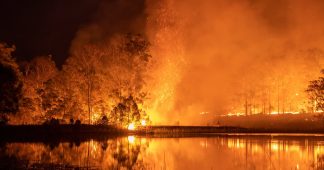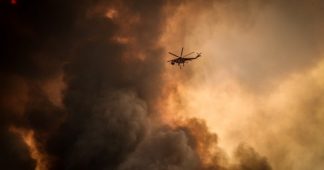by Hall Greenland
These seem like biblical times in Australia. A time of fire and now pestilence.
In the months before and after Christmas, the south-east coast of Australia was engulfed in a series of major bushfires that burnt through over 8 million hectares and killed 33 people. Expert estimates put the number of wildlife that perished at one billion creatures.
While not as fatal to humans as the 2009 fires which killed 179 people, the material and economic damage was more extensive: whole towns were burnt down, thousands of homes destroyed and in some places people had to be evacuated by sea. The major cities of Sydney and Melbourne were smothered in smoke for days on end as air quality significantly exceeded World Health Organisation safe levels.
All this occurred in conditions of the worst drought for generations.There can be little doubt that these disasters are made both more likely and worse by climate change. In the wake of the fires the movement for 100% renewables by 2030, an end to fossil fuel exports and a just transition for coal miners, underwent a huge expansion.
However, no sooner had the slow recovery from those fires begun than the corona virus arrived.
As of the last week of March, the human impact of the Covid-19 pandemic has been at the mild end of the spectrum. Nearly 3,000 cases and 8 deaths in a population of 25 millions. But the number of cases is steeply rising and the federal and state governments have introduced varying degrees of social isolation and lockdown in the hope of slowing and ending the spread of the virus.
This containment is vital, as like everywhere in the globalised, financialised neoliberal economy, Australia has rundown both its manufacturing and public health systems. Some estimates of the serious cases that will need hospitalisation have reached 20,000, yet the number of intensive care beds is just 2,000. Ventilators and masks are in short supply and staff endurance is already being stretched.
A further complication in Australia is that it is a settler capitalist society with a surviving indigenous population. Indigenous Australians suffer from much higher rates of pulmonary and other diseases and are at far greater risk of death from Covid-19 than white Australians. At this stage, their more remote communities are free of the virus but are not yet in total lockdown.
Unlike neighbouring New Zealand, which has opted for an almost total social and economic lockdown for the next four weeks, Australian governments have reacted more slowly and partially. Schools, universities, and shops mostly remain open, domestic travel is restricted but continuing, and major parts of the economy continue to operate normally. Nevertheless, the hospitality, entertainment and tourist sectors are closed and the unemployment rate has doubled in the past week to at least 10 per cent and growing.
Despite the fact that nearly 40 per cent of the workforce are casuals in precarious employment and have no sick or holiday leave pay, Australian governments – at federal and state levels they are mostly conservative coalitions – have not implemented wage guarantees as is the case in even many western European countries. In Britain, for instance, the guarantee is for 80 per cent of normal wages if laid off because of Covid-19. Nor have governments suspended rent or mortgage payments for people who become unemployed. Sadly, the main opposition Labor party has remained silent on these essential measures, such is the grip of neoliberal austerity fundamentalism on the political class in Australia.
The relatively moderate monetary and fiscal stimulus boost to the economy, mostly in the form of grants, zero interest rates, quantitative easing and loan guarantees aimed at business owners, will not prevent a major recession.
Ironically, given Australia’s subaltern obedience to Washington in world affairs (wherever US imperialism invades, Australian troops will be there bringing up the rear) it is a recovery in the Chinese economy that will soften the impact of that recession in Australia. China buys some 35 per cent of Australian exports.
As many cynics have remarked, at least greenhouse gas emissions are falling at last, no matter how temporarily. But whether these grim times are preparing the way for a decisive eco-socialist movement that can reverse current ecological ruin, attack the conditions for dangerous viruses emerging and spreading, and give priority to healthcare and other pressing human needs over capital accumulation, is yet to be seen. In Australia, as elsewhere, the need for such a mass revolutionary movement has been reinforced by events of the past few months.











